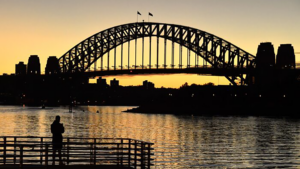Home » Commentary » Opinion » Omicron: A New Variant and New Hope for Australia
· Epoch Times
 As we approach the end of 2021, COVID-19 adds another component in the Greek alphabet for us to learn—the 15th letter, Omicron.
As we approach the end of 2021, COVID-19 adds another component in the Greek alphabet for us to learn—the 15th letter, Omicron.
And just as a new variant emerges, provoking grim fear of more restrictions, hundreds of thousands of Australians have been taking to streets of our major cities to protest the heavy-handed exercise of government power—strong evidence of a marked change in the way many Australians are now thinking about COVID-19.
Omicron appears to be very transmissible. However, the good news is that medical experts do not yet consider it as dangerous as the Delta variant that paralysed much of the country in the middle of the year.
Chief Medical Officer Paul Kelly has also sought to allay fears that established COVID-19 vaccines might be ineffective against it.
Political leaders are also promising not to re-impose general lockdowns. Australian Prime Minister Scott Morrison has urged people not to be “spooked” by Omicron.
But many are feeling very anxious as the holiday season arrives, in case additional rules are imposed over the summer vacation should case numbers continue to climb.
New restrictions are already in place for international travellers who come to Australia—especially for those arriving from some African countries.
Yet having endured extended lockdowns during 2021, and having dutifully accepted responsibility for getting jabbed promptly, many Australians will certainly baulk at the strain of new restrictions as they plan ahead for Christmas.
We can see evidence of a change in the public’s mood; as shown by those marches protesting, particularly the imposition of vaccine mandates.
People are angry that these mandates are creating divisions between people and are forcing a form of segregation upon us.
But people are also angry that even with high rates of double vaccination in Australia freedoms here are still constrained, state borders remain closed, and families are unable to be together over the holiday season.
Whatever discipline political leaders are able to exercise over their parties and governments, they cannot ignore these significant shifts in public opinion—especially given that, as elections fall due in 2022, most of those protesting marchers will eventually voice their views at the ballot box.
Lockdowns were hard for those who endured the mental strains of isolation, the financial strains of lost incomes and livelihoods, and the emotional strains of separation from families and loved ones.
For the most part—with notable exceptions, such as in Western Australia—people around the country leapt at the chance to unlock themselves from COVID-19 restrictions by getting vaccinated quickly. And by the end of November, 73 percent of us had had the double dose.
Having responded to government assurances that liberation would come through vaccination, Australians now want their elected politicians to keep their side of the bargain—and those politicians need to pay attention.
Of course, the state owes a duty to protect its citizens—the very justification for imposing comprehensive health restrictions and regulations in a time of pandemics.
At the same time, citizens owe a duty to comply with directives from the state intended to secure the health and well-being of the community. When citizens refuse to comply with those directives, they can actually prevent the state from carrying out its duty of care.
But citizens can eventually decide they don’t want the kinds of “protection” being pressed upon them by the state. Or they can decide that the protections on offer are excessive or redundant, preferring instead to take responsibility for their own well-being, and that of their families.
When that happens, there must always be opportunities to voice dissent in an open and free society.
And so people take to the streets and march in peaceful protest against what democratically elected governments are doing.
The lesson our politicians need to learn is that where demonstrations of dissent is ignored or quelled, the compact between state and citizen—comprising a web of mutually owed duties and responsibilities—comes under great strain.
The eyes of the world turned upon Australia, aghast at what this supposedly freedom-loving country was imposing upon its citizens; seemingly without a murmur of dissent.
But now the people are stirring and appear to be saying that life has to resume. Grandchildren need to be held; the departed need to be mourned; and those joined in marriage need to be celebrated by their families.
COVID-19 has been hard for us all. However, paradoxical as it may seem, the advent of Omicron is the signal that now is the time when we need to resume our lives, to accept the risks intrinsic to lives well lived; and to cast the burden of overbearing government from our shoulders.
Omicron: A New Variant and New Hope for Australia